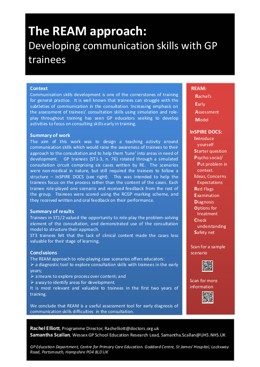Developing Communication Skills with GP Trainees: The REAM Approach
Dr Rachel Elliott, Dr Samantha Scallan
Background
Communication skills development is one of the cornerstones of training for general practice. The subtleties of communication in the consultation can be an area with which trainees struggle. Increasing emphasis on the assessment of the consulting skills of trainees using simulation and role-play throughout training, has seen GP educators seeking to develop activities to focus on consulting skills early in training.
Summary of Work
The aim of this work was to design a teaching activity around communication skills which would raise the awareness of trainees to their approach to consulting in order to help them tune into the areas they needed to develop. GP trainees (ST1-3, n 76) attended a simulated consultation circuit comprising cases written by RE. Although reflecting clinical cases and played out as such in role play, the scenarios were non-medical in their subject matter. This was intended to help the trainees focus on the process rather than the content of the ‘cases.’ Trainees were scored using the RCGP marking scheme and they received written feedback on their performance.
Summary of Results
Trainees in ST1/2 valued the opportunity to role play the problem solving element of the consultation and demonstrated use of a consultation model to structure their approach. ST3 trainees felt that the lack of clinical content made the cases less valuable for their stage of learning.
Conclusions
The REAM approach to role playing case scenarios offers educators a diagnostic tool to explore consultation skills with trainees in the early years, a means to explore process over content. It is, however, less relevant and valuable to trainees in their final year.

Conferences
| Title | Type |
|---|---|
| AMEE Conference 2013 | Poster presentation |
| DEMEC 2015 | Poster presentation |
| Ottawa Conference 2014 | Poster presentation |
| RCGP Conference 2013 | Poster presentation |
| UKCEA (United Kingdom Conference of Educational Advisors) 2013 | Poster presentation |
Related events, research and information
Knows How, Shows How, Does? Assessing the Impact of Facilitated Small-Group Learning on GP Trainees’ Consultation Skills
17 August 2016 – Background Preparation for high stakes assessments such as the CSA (membership exam for the RCGP, UK) can lead...
The Value of Actors to GP Trainer and Appraiser CPD
17 August 2016 – Background Actors have been used for many years in the training and formative development of doctors, as well...
Hi-Fidelity Human Simulation
21 December 2016 – Using trained actors to simulate trainee doctors in difficulty is a cost-effective communication skills...
Mind the Gap: Using EBL as a Platform for Transition in General Practice Training
17 August 2016 – Background General Practice (GP) trainees in their first two years of training attend monthly educational...
Exploring Non Verbal Communication with Trainees for General Practice
17 August 2016 – Background Communication skills development is one of the cornerstones of training for general practice. The...
The Drama of Communication: A Workshop to Enhance Communication Skills
14 December 2016 – Background Traditionally in training programmes for general practice, communication skills are taught by...
MRCGP
25 May 2016 – The MRCGP is required by GP Trainees to gain Certificate of Completion of Training in General Practice (CCT)....
ST3
23 March 2016 – ST3 Teaching Sessions The ST3 teaching course provides educational sessions for ST3 Trainees. It is based at...
Understanding Uncertainty
17 August 2016 – Background The ability to tolerate uncertainty allows a doctor to manage patients appropriately, and in so...
